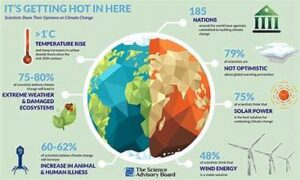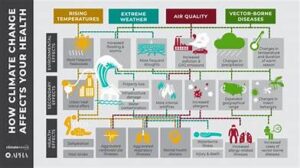
Climate change has become one of the most pressing issues of our time, and recent breakthroughs in research and technology are playing a crucial role in shaping our response to this global challenge. From innovative technologies to advanced scientific methods, these advancements are offering new insights and solutions for mitigating climate change and adapting to its impacts. This article explores some of the most exciting breakthroughs in climate change research and how they are influencing our future.
1. Advanced Climate Modeling and Simulation
One of the significant breakthroughs in climate change research is the development of advanced climate modeling and simulation techniques. Traditional climate models have provided valuable insights into climate patterns and projections, but new technologies are enhancing their accuracy and capabilities.
High-Resolution Models: Recent advancements have led to the creation of high-resolution climate models that offer more detailed and accurate predictions. These models use advanced computing power and sophisticated algorithms to simulate climate conditions at a finer scale, allowing scientists to understand regional and local impacts of climate change more precisely.
AI and Machine Learning: Artificial Intelligence (AI) and machine learning are revolutionizing climate modeling by analyzing vast amounts of climate data and identifying patterns that may not be apparent through conventional methods. These technologies enhance the predictive power of climate models and provide more reliable projections for future climate scenarios.
2. Innovations in Carbon Capture and Storage (CCS)
Carbon capture and storage (CCS) technology is a key tool in reducing greenhouse gas emissions and combating climate change. Recent breakthroughs in CCS are making this technology more efficient and cost-effective.
Direct Air Capture (DAC): Direct air capture is a groundbreaking technology that removes carbon dioxide directly from the atmosphere. Recent advancements have improved the efficiency of DAC systems, making them more viable for large-scale implementation. This technology has the potential to significantly reduce atmospheric CO2 levels and mitigate global warming.
Enhanced Oil Recovery (EOR): Enhanced oil recovery techniques, which involve injecting captured CO2 into oil reservoirs to increase extraction rates, are being optimized for better performance. These advancements not only boost oil production but also store CO2 underground, contributing to climate change mitigation.
3. Renewable Energy Technologies
The transition to renewable energy sources is crucial for reducing reliance on fossil fuels and addressing climate change. Recent technological innovations are accelerating this transition and making renewable energy more accessible.
Next-Generation Solar Panels: Advances in photovoltaic technology are leading to the development of more efficient and durable solar panels. Innovations such as perovskite solar cells and bifacial panels are increasing energy conversion rates and extending the lifespan of solar panels, making solar energy a more attractive option.
Wind Turbine Innovations: Modern wind turbines are becoming more efficient and capable of generating power in a wider range of conditions. Developments in turbine design, materials, and control systems are enhancing their performance and reducing the cost of wind energy.
4. Climate-Smart Agriculture
Agriculture is both a contributor to and a victim of climate change. Innovative technologies in climate-smart agriculture are helping to increase resilience and reduce emissions from the agricultural sector.
Precision Agriculture: Precision agriculture uses advanced technologies such as GPS, drones, and sensors to optimize farming practices. By providing real-time data on soil conditions, crop health, and weather patterns, these technologies enable farmers to make more informed decisions and reduce resource waste.
Sustainable Farming Practices: Research into sustainable farming practices, such as agroforestry and regenerative agriculture, is gaining momentum. These practices improve soil health, enhance biodiversity, and sequester carbon, contributing to overall climate resilience.
5. Ocean-Based Solutions
The oceans play a vital role in regulating the Earth’s climate, and recent research is uncovering new ways to harness ocean-based solutions for climate change mitigation.
Ocean Fertilization: Ocean fertilization involves adding nutrients to the ocean to stimulate the growth of phytoplankton, which absorb CO2 during photosynthesis. While still in the experimental stage, this approach has the potential to enhance carbon sequestration in marine ecosystems.
Blue Carbon: Blue carbon refers to the carbon stored in coastal and marine ecosystems, such as mangroves, seagrasses, and salt marshes. Protecting and restoring these ecosystems can significantly contribute to carbon sequestration and climate change mitigation.
6. Policy and International Collaboration
Technological advancements alone are not enough to tackle climate change; effective policies and international collaboration are essential for implementing and scaling these solutions.
Climate Agreements: International agreements such as the Paris Agreement play a crucial role in coordinating global efforts to combat climate change. These agreements set targets for emissions reductions and provide a framework for countries to collaborate on climate action.
Funding and Incentives: Governments and organizations are increasingly providing funding and incentives for climate change research and technology development. These financial resources support innovation and accelerate the deployment of climate solutions.
Conclusion
Breakthroughs in climate change research and technology are transforming our approach to addressing one of the most significant challenges of our time. From advanced climate modeling and carbon capture to renewable energy innovations and climate-smart agriculture, these advancements are shaping our future and offering hope for a more sustainable world. However, it is essential to continue supporting research, fostering international collaboration, and implementing effective policies to ensure that these technologies achieve their full potential in combating climate change.



